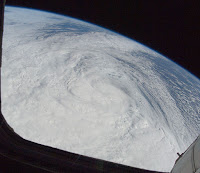 |
| Hurricane Sandy from space Accessed from www.wikimedia.org |
By Ajoy Datta
As George Monbiot argues in the Guardian, there are several ways in which the impact of the recent hurricane Sandy is likely to have been exacerbated by man-made climate change.
Although there’s little doubt that our climate is changing, understanding precisely how and what we do to prepare for it is far from straightforward.
It might at first seem a matter for environmental and meteorological scientists (PDF).
But experts need to be engaged from areas such as food security and agriculture, natural resource management, ecosystems and biodiversity, infrastructure and human health. Expertise is also required to help map out adaptation options, including disaster risk reduction (DRR) measures to manage hydro-meteorological risks, such as dykes and dams to mitigate flooding, or to assess the feasibility of introducing different crop varieties.
However, discussions shouldn’t be limited to scientists and other experts. Communities have for centuries developed their own ways of coping with climactic variability and extreme weather events. Often, non-governmental organisations, community groups and social movements are better at self-organising and working coherently and quickly towards a common goal than government authorities. This may be because these smaller, local organisations and groups often have a stronger understanding of local context and are more likely to take ownership over solutions.
Resonating with findings from a recent report by David Booth (who argues that governance challenges in Africa are not fundamentally about one set of people getting another set of people to behave better but about both sets of people finding ways to act collectively in their own best interests), in my article for the IDS Bulletin, entitled Deliberation, Dialogue and Debate: why researchers need to engage with others to address complex issues, I have argued that traditional linear approaches to communicating research to policymakers are inadequate. Researchers now share the field of knowledge production and communication with many others. Where appropriate, those who view their role in relation to policy should be prepared to engage with stakeholders affected by policy issues and expose their findings to review and discussion.
If researchers aim to engage in dialogue through structured processes, experience has shown that careful planning is required to clarify intentions, select who to engage with, when to engage, and how best to do so.
Skilled intermediaries can be adept at facilitating engagement processes by, for instance, providing information to participants, developing their capacities, and thus making efforts to redress power asymmetries. But in doing so, some researchers will need to alter their own mind-sets. This may mean working in inter-, multi- and/or trans-disciplinary research teams, admitting to being part of a value-based system, and disempowering themselves in relation to other stakeholders such as members of the public.
And research institutions need to provide researchers with the right incentives to engage effectively, enable them to contribute to policy and political processes and develop realistic expectations as to what they can collectively achieve.
Ajoy Datta is a Research Fellow at the Overseas Development Institute (ODI) and wrote the IDS Bulletin article Deliberation, Dialogue and Debate: why researchers need to engage with others to address complex issues (PDF).
More blogs on the IDS Bulletin New Roles for Communication in Development?
